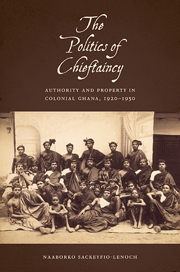Book contents
- Frontmatter
- Dedication
- Contents
- List of Illustrations
- Acknowledgments
- Abbreviations
- Introduction: Contesting Space and Authority in a Colonial Capital
- 1 Situating Ga Institutions in the European Colonial Milieu
- 2 Land Legislation, Commodification, and Effects in Accra
- 3 Negotiating Chieftaincy, the Ga Stool, and Colonial Intervention
- 4 Succession Disputes, the Ga State Council, and the Future of Chieftaincy
- 5 Contesting Property in Accra and Its Periurban Locales
- Conclusion
- Notes
- Bibliography
- Index
Introduction: Contesting Space and Authority in a Colonial Capital
Published online by Cambridge University Press: 05 October 2014
- Frontmatter
- Dedication
- Contents
- List of Illustrations
- Acknowledgments
- Abbreviations
- Introduction: Contesting Space and Authority in a Colonial Capital
- 1 Situating Ga Institutions in the European Colonial Milieu
- 2 Land Legislation, Commodification, and Effects in Accra
- 3 Negotiating Chieftaincy, the Ga Stool, and Colonial Intervention
- 4 Succession Disputes, the Ga State Council, and the Future of Chieftaincy
- 5 Contesting Property in Accra and Its Periurban Locales
- Conclusion
- Notes
- Bibliography
- Index
Summary
In November 1873 Henry Morton Stanley, as a special correspondent for the New York Herald traveling in West Africa, arrived via ship at the Gold Coast. The view ashore was of a linear beach, supported by a mud terrace that stretched for many miles to the right and left. Behind it spread Accra, divided into two main districts, James Town and Ussher Town. Accra was dotted with whitewashed houses that rose above clay-brown huts on the edge of the terrace that overlooked the beach. Wide verandas and spacious grounds marked the houses of wealthy merchants, providing an air of exclusivity and what seemed a visible need to procure unpolluted air. Another set of abundant grounds and wide verandas belonged to the Basel Mission House, a community of religious Swiss and Germans. In the center of town, the port and lighthouse were visible. Between these structures, native and European buildings were jammed together. Three miles east of the Basel Mission was the village of Christians-borg, consisting of whitewashed buildings, a ruined tower and castle, and another Basel Mission establishment.
Even in the 1870s Stanley might have noticed that Accra had pockets that looked and felt distinctively European. As the historian John Parker has discussed, the port city already had a long tradition of engaging people from outside. This was a town influenced by people from across the Atlantic. Indeed, as Stanley would soon have seen, within Ga society there was already a role for intermediaries who served as cultural brokers between Ga residents and Europeans and African foreigners and between more cosmopolitan coastal people and those who lived in the interior.
- Type
- Chapter
- Information
- The Politics of ChieftaincyAuthority and Property in Colonial Ghana, 1920-1950, pp. 1 - 22Publisher: Boydell & BrewerPrint publication year: 2014

